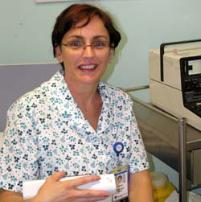Public seminar outlines new user-friendly CPR
Published on 16 November, 2006
Central Queensland University conducted a public seminar on Australia’s new, simplified guidelines for Basic Life Support (BSL) at CQU Rockhampton this week (Thursday November 16).
The seminar was video-conferenced to Bundaberg, Gladstone and Mackay.
In March 2006, the Australian Resuscitation Council (ARC) released updated guidelines for life support. These changes were based on an extensive review of the resuscitation science guidelines by the International Liaison Committee on Resuscitation.
 As the Queensland Representative for the Australian College of Critical Care Nurses Resuscitation Committee, CQU’s Dr Trudy Dwyer will present the changes, the evidence behind the changes and discuss how these changes translate to resuscitation practice both in and out of the hospital environment.
As the Queensland Representative for the Australian College of Critical Care Nurses Resuscitation Committee, CQU’s Dr Trudy Dwyer will present the changes, the evidence behind the changes and discuss how these changes translate to resuscitation practice both in and out of the hospital environment.
Dr Dwyer said the new guidelines were more user friendly than the previous guidelines.
“It is anticipated that the guideline changes will increase individual confidence and ultimately expedite the initiation of CPR,” Dr Dwyer explained.
She said the ARC has recognised that ‘any attempt is better than no attempt’.
“Immediate bystander intervention has been recognised to be potentially one of the most influential steps in improving outcome following cardiac arrest.”.
Dr Dwyer recently conducted a study of 1208 Central Queensland residents and found that 74% had learned CPR at some stage. Although this was better than most studies, both within Queensland and Australia, getting people to use their skills was the challenge.
“Only a quarter of individuals in private settings who have CPR training will ultimately initiate CPR should they witness a cardiac arrest.”.
The study found that only 68% of lay public were confident to initiate CPR on a family member should they have a cardiac arrest today. These participants expressed concerns about correctly performing CPR.
“The complexity of learning CPR has been identified as a barrier to CPR skill acquisition and skills retention,” Dr Dwyer said.
Photo: Dr Trudy Dwyer.

